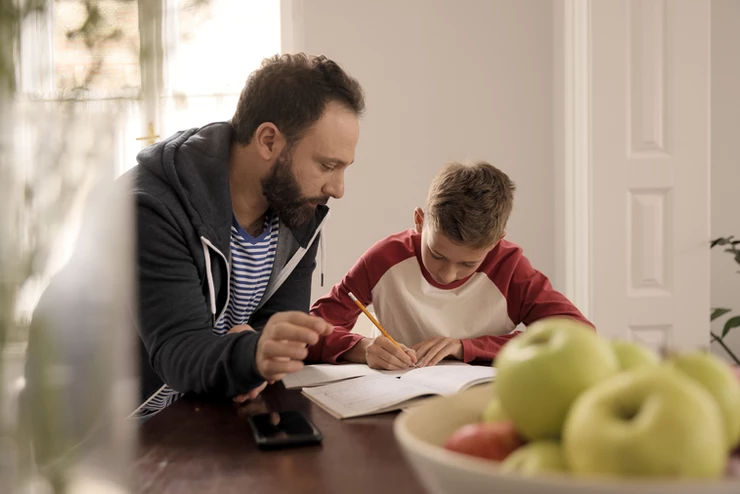Here’s How to Navigate Parenting Stress

If you feel like your little ones require a Mount Everest level of patience lately, you aren’t alone.
Throw in 2 years of adjusting to the way the pandemic toppled everyone’s routine, and it’s no wonder why some parents are reportedly more stressed today.
Practicing healthy stress management can help you and those you care for find more peace in the day.
What causes parenting stress?
Stress is a poor boundary keeper. Work stress doesn’t stay confined to the office. Financial worries don’t magically go away when your child is sick and sleepless.
The parenting journey is naturally peppered with seasons of heightened stress and worry — from the sleepless newborn stage to the teenage rebellion years and beyond.
A list of what doesn’t cause parenting stress might be shorter. Nevertheless, these are common factors that can make parenting stress worse:
childhood development disorder
child discipline
anxiety at work
financial depression
work-life balance
family planning
mental load
parent burnout
conflict with other caregivers (ex-spouses, day care, teachers)
caring for elderly parents
lack of social support
What’s the difference between parental stress and distress?
You’ll likely worry about your child’s development, behavior, and safety their whole life.
On top of that, there may be a (seemingly) never-ending carousel of honey-do line items. But if your day-to-day becomes overwhelming, your feelings may transform into chronic anxiety or debilitating depression that causes you to question your ability as a parent. In this case, you might be distressed.
Addressing your mental health with a therapist or doctor is the best way to show up for your child.
If you’re experiencing a sadness that won’t seem to lift, you may want to stay on the lookout for these depression symptoms:
hopelessness
loss of interest in hobbies
mental fog
irritability
sleeplessness
thoughts of suicide
Parental stress index, what it means
The parenting stress index is a 120-question screening test, designed to measure stress in the parent-child relationship. A parenting index short-form version can be completed in about 10 minutes.
The test can be used to assess families and identify children who may be at risk for dysfunctional relationships.
If you’d like to evaluate your stress levels on your own, try the parental stress scale (PSS). It’s a widely used (and free!) tool to measure parent-related stress. The PSS can be a helpful first step in determining if your stress is too high.
How do you deal with parenting stress?
Engaging with stress in healthier ways can help stressed-out parents lean into both the highly joyful and the meaningful, quiet moments that come with raising kids.
As the experts say, your diet, exercise, and sleep are so important to keep your stress down. You can build upon those healthy habits with these parent-friendly ways to restore your Zen:
Developing a behavior management plan
Don’t be subject to the whim of your child’s emotions the next time they cross a boundary.
Sticking to a plan of action for discipline means you and your child know exactly what to expect. And it saves your mind from diving into a stressful place of panic or anger.
Parents of children with ADHD (attention-deficit hyperactivity disorder) and other mental health conditions can feel lost when it comes to establishing rules and boundaries for their kid.
But it’s possible to find a disciplinary framework that helps you model calm while honoring your child’s needs.
Savoring the moment
Children can be fascinated by the way a caterpillar crawls across a leaf or Play-Doh squishes in their hands, or older kids might be discovering the cathartic power of good music.
These are all examples of what researchers call savoring — really exploring the details of an experience with an inquisitive attitude.
As a parent, savoring those little moments alongside your kids has been shown to increase positive feelings and enjoyment. Embracing this sense of wonder is also a parent-friendly portal into mindfulness, which this 2019 study suggests may lower parenting stress.
Turning the tunes up
Listening to music may reduce your cortisol (stress hormone) levels, according to a 2021 study.
So you can wiggle your body while your baby giggles, ask your toddler to join you to do the twist, or embarrass your teenager with your “classic” moves from back in your day.
Moving your body and listening to music can benefit everyone mentally and physically.
Having open conversations about mental health
If you’re feeling limited as a parent due to your mental health condition or parenting a child who’s a received diagnosis, a candid talk could be just what’s needed to relieve the tension.
Speaking openly about mental illness can help prevent your child from internalizing some of your behavior.
This talk could also help your child feel validated if they live with a mental health condition.
An ongoing, nonjudgmental conversation does wonders for diffusing built-up stress and promoting a sense of calm.
Meditation and mindfulness
For many parents, finding 20 quiet, uninterrupted minutes to routinely meditate is straight-up laughable. So instead, you can try 1-minute meditations.
Or you can just focus on your breath and concentrate on textures, noises, or visuals around you that you find beautiful.
Capturing even the smallest occasions to be mindful can help your presence during parenting.
A growing body of research suggests that mindful parenting may influence the development of kids’ decision-making in social situations.
Let’s recap
Stress is natural, and parenting stress is unavoidable. When stressful emotions and tensions are channeled into healthy coping strategies, though, you make more room for restorative family dynamics and positive behavioral outcomes from your kids.